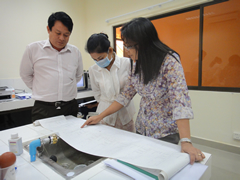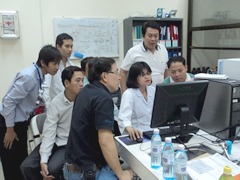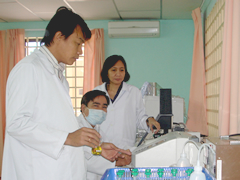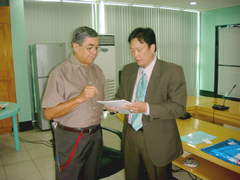- Home
- Technical Cooperation Projects
- Index of Countries
- Asia
- Cambodia
- Capacity Building for the Quality Standard Control of Agricultural Materials (Chemical Fertilizers and Pesticides)
- Project News
- Filipino Experts are Playing Active Roles in Triangle Cooperation of the QCAM Project.
Project News
2011-02-25
Filipino Experts are Playing Active Roles in Triangle Cooperation of the QCAM Project.
One of the unique characteristics of Project of Capacity Building for Quality Control of Agricultural Materials (Fertilizers and Pesticides) (QCAM Project) is that it has been closely cooperating with the Department of Agriculture (DA) in Philippines from its planning stage.
JICA implemented a technical cooperation project in the Philippines named "Pesticide Monitoring System Development (PMSD Project)" from 1997 to 2002, which worked for improvement on administration and management of pesticides by Fertilizer and Pesticide Authority (FPA) as well as for enhancement of analytical skills of pesticides by Bureau of Plant Industry (BPI).
By utilizing such experiences and improved skills of Filipino counterparts through the PMSD Project, the QCAM Project set off to upgrade analytical skills of the Cambodian laboratory staff at the Ministry of Agriculture, Forestry and Fisheries (MAFF) in March 2009 for a period of three years (Note: It is so called Triangle Cooperation[1]). Up to now, seven Filipino experts in total have been sent to the QCAM Project since the beginning of the Project. They have been playing active and important roles as experts on analysis of chemical fertilizers and pesticides and on review of administrative work for those agricultural materials.
For instance, Ms. Ma. Esperanza DG Uy worked for the QCAM Project twice from August to December 2009 and from February to July 2010 as an expert on formulation analysis of pesticides. Ms. Laylo Erlinda is also working for the QCAM Project from November 2010 to March 2011, and both of them are from the BPI of the DA. They were the counterpart staff of the PMSD Project, who enhanced analytical skills of pesticides through the PMSD project and the technical trainings in Japan. Now they are experts of the QCAM Project, who train staff of the MAFF in Cambodia. As another example, it was the first time for Ms. Edna Lynn C. Floresca, an expert on analysis of chemical fertilizers from Bureau of Soils and Water Management (BSWM) of the DA, to work for a technical cooperation project in the QCAM Project. She served for the QCAM Project twice, from August to December 2009 and from February to July 2010. Having convinced values of collaboration in the QCAM Project, she has been still involved in another local project related to the analysis of chemical fertilizers after returning to the Philippines.
 Ms. Ma. Esperanza DG Uy training Cambodian counterparts on formulation analysis of pesticides (Right).
Ms. Ma. Esperanza DG Uy training Cambodian counterparts on formulation analysis of pesticides (Right).
 Ms. Laylo Erlinda training Cambodian counterparts on formulation analysis of pesticides (Third person from the right).
Ms. Laylo Erlinda training Cambodian counterparts on formulation analysis of pesticides (Third person from the right).
On the other hand, Cambodian counterparts of the QCAM Project have visited the FPA in the Philippines three times to participate in a Technical Information Exchange Program (TIEP). The FPA has several staffs who were trained during the PMSD Project. Professor Francisco Cornejo, a former executive director of the FPA, was one of the seven Filipino experts dispatched to Cambodia, and also worked as a consultant for the TIEP of the QCAM Project in Manila.
 Ms. Edna Lynn C. Floresca training Cambodian counterparts on analysis of chemical fertilizers (Right).
Ms. Edna Lynn C. Floresca training Cambodian counterparts on analysis of chemical fertilizers (Right).
 Professor Francisco Cornejo talking with Mr. Ouk Syphan, Director of the Department of Agricultural Legislation (DAL) of the MAFF in Cambodia, in the second TIEP.
Professor Francisco Cornejo talking with Mr. Ouk Syphan, Director of the Department of Agricultural Legislation (DAL) of the MAFF in Cambodia, in the second TIEP.
Thus, the QCAM Project has been operated under "Triangle Cooperation" scheme by dispatching experts who were once involved in JICA's projects as counterpart staff. Although the number of the Triangle Cooperation projects is still small, the importance of the Triangle Cooperation will surely rise, considering its efficiency in Overseas Development Assistance (ODA). Since the JICA has been one of the major donors to Asian countries and has built up good mutual understanding and relationships with them, there are strong needs for the Triangle Cooperation in the world that only the JICA can implement. As one of the Japanese experts who is experiencing collaboration with Cambodian and Filipino people through the QCAM Project, I sincerely hope that the friendship and cooperation between those two countries and Japan will be further strengthened and that the JICA will contribute to establish a globally contributing development cooperation system through successful implementation of the Triangle Cooperation projects.
Written by Toshinori Hamaguchi, JICA Expert
Note
- [1] "Triangle Cooperation" is one form of the South-South Cooperation, where people tackle development challenges with good experiences and knowledge of developing countries, while receiving financial and technical support from developed countries.
- About JICA
- News & Features
- Countries & Regions
- Our Work
- Thematic Issues
- Types of Assistance
- Partnerships with Other Development Partners
- Climate Change / Environmental and Social Considerations
- Evaluations
- Compliance and Anti-corruption
- Science and Technology Cooperation on Global Issues
- Research
- JICA Development Studies Program / JICA Chair
- Support for the Acceptance of Foreign HRs / Multicultural and Inclusive Community
- Publications
- Investor Relations
